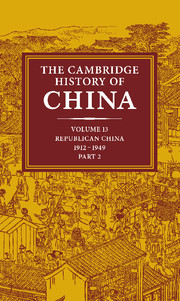Book contents
- Frontmatter
- 1 Introduction: perspectives on modern China's History
- 2 China's international relations 1911–1931
- 3 Nationalist China during the Nanking decade 1927–1937
- 4 The Communist movement 1927–1937
- 5 The agrarian system
- 6 Peasant movements
- 7 The development of local government
- 8 The growth of the academic community 1912–1949
- 9 Literary trends: the road to revolution 1927–1949
- 10 Japanese aggression and China's international position 1931–1949
- 11 Nationalist China during the Sino-Japanese War 1937–1945
- 12 The Chinese Communist movement during the Sino-Japanese War 1937–1945
- 13 The KMT-CCP conflict 1945–1949
- 14 Mao Tse-Tung's thought to 1949
- Bibliographical Essays
- Bibliography
- Conversion table: pinyin to Wade-Giles
- Index
- Republican China - physical features">
- References
6 - Peasant movements
Published online by Cambridge University Press: 28 March 2008
- Frontmatter
- 1 Introduction: perspectives on modern China's History
- 2 China's international relations 1911–1931
- 3 Nationalist China during the Nanking decade 1927–1937
- 4 The Communist movement 1927–1937
- 5 The agrarian system
- 6 Peasant movements
- 7 The development of local government
- 8 The growth of the academic community 1912–1949
- 9 Literary trends: the road to revolution 1927–1949
- 10 Japanese aggression and China's international position 1931–1949
- 11 Nationalist China during the Sino-Japanese War 1937–1945
- 12 The Chinese Communist movement during the Sino-Japanese War 1937–1945
- 13 The KMT-CCP conflict 1945–1949
- 14 Mao Tse-Tung's thought to 1949
- Bibliographical Essays
- Bibliography
- Conversion table: pinyin to Wade-Giles
- Index
- Republican China - physical features">
- References
Summary
The Chinese revolution is often considered the greatest peasant revolution in history, even the very archetype of peasant revolution. Certainly the Chinese Communists could not have won power without the peasant armies and the support of so many villagers. Yet without the Communists the peasants would, quite simply, never have conceived the idea of a revolution.
To support this proposition the present chapter deals first with peasant unrest that was spontaneous, contemporary with and yet independent of the Communist movement, and provoked by those three major drains on peasant income, namely rent, interest and taxes. A second section sketches a typology of rural disturbances in Republican China, after briefly describing those which were not provoked by rent, usury or taxation. Both the disturbances that are analysed in the first section and those alluded to in the second section were eminently traditional flare-ups of peasant anger, as ephemeral as they were sudden, and seldom a threat to the established order. In short, a huge distance lay between what the peasants could do spontaneously and what the Communists made it possible for them to do under Communist leadership. The third section therefore examines some of the difficulties that the Communists faced and the methods they used to overcome them. To forge victory for the revolution, using the basic peasant material, was such an opportunity but also such a challenge! Faithful to Lenin's teaching and example (never mind if the peasantry rather than the workers constituted the basic material), the Chinese apostles of the revolution, who became specialists in the conquest of power, took up that challenge and overcame the difficulties by dint of a mixture of abnegation and cunning that aroused not only enthusiasm but also resentment.
A preliminary warning must be given about statistics on the relative frequencies of the various categories of rural disturbances and riots. Statistical tables and percentages would provide only an illusory guarantee of accuracy on account of the heterogeneity of the sources and the extreme variability of the details that they contain. For example, during the Nanking decade, of close to a thousand incidents recorded or simply mentioned, barely one hundred can be described in accurate detail on the basis of the information available, which varies from a few lines to a few pages or at most a few dozen pages.
- Type
- Chapter
- Information
- The Cambridge History of China , pp. 270 - 328Publisher: Cambridge University PressPrint publication year: 1986
References
- 6
- Cited by

